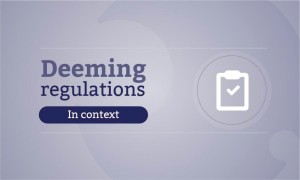 U.S. media reactions to the new deeming rule ran the gamut from praise for an FDA which had produced “sensible regulations”, to fierce criticism for an agency which will supposedly do more to promote smoking than to stop it.
U.S. media reactions to the new deeming rule ran the gamut from praise for an FDA which had produced “sensible regulations”, to fierce criticism for an agency which will supposedly do more to promote smoking than to stop it.
The New York Times, perhaps the most influential of all U.S. publications, took a soberly welcoming line. It described the regulations as “thoughtful and measured”, while characterising as “ridiculous” the view of “some in the electronic cigarette and tobacco industry [that] the F.D.A.’s rules are a form of prohibition”.
Importantly, the Times also felt that the FDA “should certainly revisit” the issue of flavours “as evidence comes in”, possibly indicating that despite its editorial writers’ unhysterical approach its sympathies fundamentally lie with the precautionary pro-regulation camp: e-liquid flavours and their reputedly enticing effect are one of the central issues for this group.
Even-handed as ever, the Times also brought in four experts from different sides of the debate to argue points such as “the rules ignore clear benefits for adult smokers” and “the e-cigarette industry needed this oversight”.
Few other media outlets were so reflective. The Albuquerque Journal in New Mexico was typical of many which seemed more concerned about the potential negatives of vaping than encouraged by the potential positives: “Given the exploding popularity of vaping among minors, and the lack of scientific study surrounding the practice, it would be unconscionable for the FDA to stand idly by.”
But there was plenty of criticism for the FDA too.
“Regulated to death”
Investor’s Business Daily was one of the most damning, placing entrepreneurialism firmly on the side of public health: “What’s the government’s response when private industry comes up with a product that actually could produce a smoke-free society? The government decides to regulate it to death.”
It accused the FDA of “tilting the playing field against newer, far safer forms of nicotine” and predicted that “many lower-income smokers will likely wind up buying packs of Marlboros again to save money”.
“In the end, the FDA’s onerous regulatory regime reveals that this agency isn’t so much interested in improving public health as it is in dictating personal behavior,” it said.
Comparable exasperation could be found at the Richmond Times-Dispatch in Virginia, a major tobacco-country publication.
Referring to senator Jesse Helms’s 1980s success in preventing the federal government from funding needle exchange programmes for drug abusers, the Times-Dispatch said “the FDA adopted the Helms approach” for the deeming regulations, and “doesn’t care about” harm reduction.
“The FDA’s punitive, puritanical approach goes well beyond what is necessary to protect public health. Indeed, it goes so far that it is likely to undermine public health by making a safer alternative to smoking more expensive and harder to get,” the Times-Dispatch charged.
Not far away in Washington, there was similar if more measured reproval from legal scholar Jonathan Adler, writing in The Washington Post.
“The part of the rule that ‘deems’ e-cigarettes to be tobacco products and subjects them to extensive regulatory requirements is more likely to harm public health than to help it. Big Tobacco, meanwhile, is likely to be pleased with the new regulations,” Adler said, although if that is true it would certainly suggest that the Richmond Times-Dispatch is not the voice of its Big Tobacco neighbours.
Local views, longer views
Many local publications concentrated on the obvious local angle: vape shops. The News Sentinel in the Tennessee city of Knoxville, quaintly determined not to allow the word “vape” fully into the language, reported that the regulations “could put dozens of Knoxville-area shops out of business and lead many ‘vape’ users to the black market, according to vaporizer store owners and experts”.
They could even “crush [the] industry”, vape store owners in Indiana told local news outlet Indystar.
Other commentators took a longer-term view, or a more overtly political one.
Writing in Newsweek, the nonprofit RAND Corporation’s behavioural scientist William G. Shadel pointed out what few had noted: “It’s important to note that some issues are still in play. The ‘final rule’ may not be all that final.
“Comfort can be taken in the fact that the FDA is moving forward to protect the public from the harms of tobacco, and that overall tobacco control policy is progressing rather than regressing. But don’t get too comfortable with the regulations as they are currently proposed. There are too many ways for them to change.”
And in the neoconservative magazine The Weekly Standard, Eli Lehrer – president of the R Street Institute think tank – seemed to see the whole issue as one more of Big Government than Big Tobacco. Lehrer opined that “members of Congress – even those who want an all out ban on e-cigarettes – should also oppose them in their current form because they’re such a blatant example of regulators asserting powers that ought to belong to Congress”.
There was, then, no shortage of opinions. But for that large constituency which is neither entirely anti, nor entirely pro, yet thoroughly bemused, Wired had the headline that summed it all up: “The US: E-Cigs Very Bad! The UK: E-Cigs OK! All of Us: Huh?”
– Barnaby Page ECigIntelligence staff







